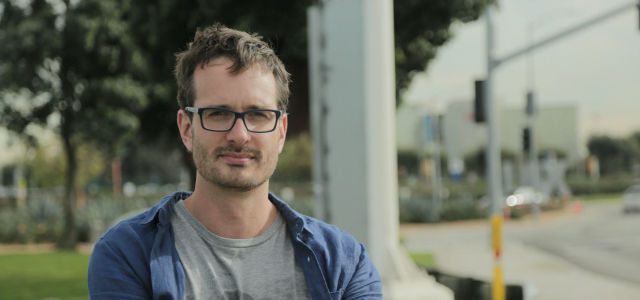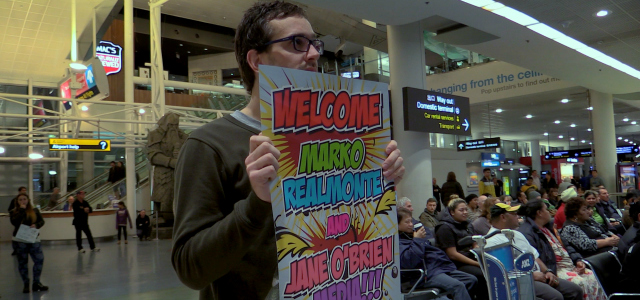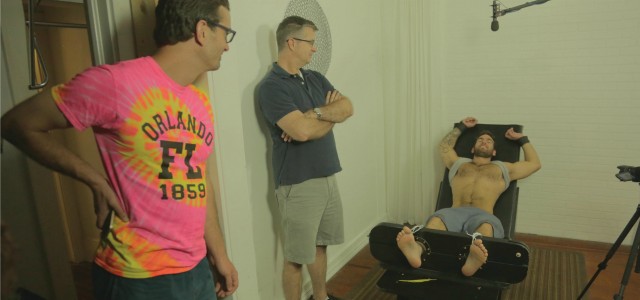David Farrier
All he did was ask a question.

Spoiler alert: This interview references events from the documentary Tickled. Don’t read on if you don’t want to know what happens.
It was a cold Thursday night in Park City, Utah. The crowd had trudged through the snow up the steps of the Library Center Theatre where the Sundance Film Festival was presenting Tickled by David Farrier and Dylan Reeve: a documentary on ‘competitive endurance tickling’. We nestled in, ready to be entertained and amused, if nothing else. I mean, competitive endurance tickling? The amusement soon waned.
Farrier is a journalist in New Zealand specialising in the odd, the bizarre, the, well, entertaining and amusing. When he stumbled on videos of fit young men in athletic gear tickling other fit young men (only these ones were restrained, bound at the ankles and the wrists, splayed) in athletic gear, ostensibly a sport, he wrote to the company that produced them, Jane O’Brien Media, to find out more, or perhaps get an interview. It would have been a slight diversion, never intended to be investigative journalism. He was quickly inundated with emails that were highly unamusing (if still somewhat entertaining) explaining, amid homophobic taunts (Farrier is gay) and xenophobic threats (he’s also a Kiwi), that ‘competitive endurance tickling’ was ‘passionately and exclusively heterosexual endurance activity’ and he was not only not welcome, they threatened lawsuits. All Farrier had done was ask a question. Soon representatives from Jane O’Brien Media, led by Kevin Clarke, were flying first class down to New Zealand—from a different hemisphere; how much does that cost?—to intimidate him. Needless to say, Tickled was far more incredible—literally—and chilling than the romp we’d been expecting.
After the screening Farrier did a Q and A and someone asked if the people who’d appeared in the film had seen it, and if so what they thought of it. Farrier asked if anyone from the film was present. Behind us, four people, shouted, pointing at the empty seat they surrounded, ‘He was here! The guy from the movie!’ ‘He was taking notes and writing down timings!’ When the film ended and the credits started the man had gotten up to leave. He leaned into the people around him. ‘Say hi to David for me,’ he said and quickly left. The theatre erupted.
David Farrier: Oh, Kevin was there!
Garth Twa: Yeah! The bad guy from the film.
DF: And someone started yelling.
GT: And the police came!
DF: That’s amazing. You were one of those people! I met one other person who was there since. That’s like a 4-D experience!
GT: It really was!
DF: It’s like the movie jumped out at you!
GT: I know! We were between Kevin Clarke and you, and he was still trying to threaten you!
DF: They’re so over the top. Everyone involved. The fact that he said that, it’s like a stereotype of what someone would say in that setting. As opposed to, like, a real thing. They were pretty intimidating, you know, the language they were using.
GT: They could’ve asked you nicely. They could have just sent an email saying they weren’t interested.
DF: That’s what’s kind of fascinating about it right from the get-go. They just did everything wrong in trying to dissuade someone from making a film. ‘We don’t want to deal with a gay journalist’: that is like a red flag to a bull.
GT: But the language was much stronger than that…
DF: Yeah, those replies. And there were a lot more than what we showed in the film. But I couldn’t really find those things insulting because they were coming from a company that made man-on-man tickling videos. Like you can’t take that seriously. When I did start to take it seriously, I suppose, was when we started getting the cease-and-desist letters from the New York lawyer and the Auckland attorney. Who were real lawyers… you know, they existed. So that’s when I went, ‘Okay, maybe it isn’t so funny.’ Like, what the hell is going on? By the time they sent those three guys…that made an impact on me because it was an expression of how much money they were putting into it. So that’s when I started thinking, ‘Okay, this is going to be a problem.’

The whole thing just seems too outlandish to be true. But the thing is it’s all true.
And that’s the crux of the film. It’s not the perversion, the sexual peccadillo, the faintest whiff of deviance; seriously, the gymnastics during the Olympics is better wank material. Competitive endurance tickling, as a fetish, is porn-lite, innocuous compared to something like, say, rainbow showers or double-fisting. It’s B & D with training wheels. The film is about the preposterous overreaction of Jane O’Brien Media, and the disproportionate malice and vindictiveness of their operating procedures, the false identities, the cover-ups, and the sadistic paranoia.
DF: Completely. I get frustrated sometimes in interviews when they say, ‘Oh, it’s a fetish film.’ It’s not about that at all. There’s an aspect to it, obviously, that acknowledges that this world of fetish exists, but it’s about this company and the people who are behind it and finding out why there are layers of secrecy and why they’re so litigious, and answering those questions. It’s much more sort of a mystery kind of investigation into what the hell is going on. And in the same way I think Jane O’Brien Media obviously isn’t just interested in getting tickling videos; they’re also really interested in the harassment and online bullying. Like it’s part and parcel of the same thing. So I think if you’re going to see a fetish film you’ll leave disappointed.
GT: What about the allegations they’ve made against you? Kevin has a very…spirited blog about you and Dylan, claiming to expose ‘not only the full extent of the lies, but the callous disregard for the humanity of anyone who dares to disagree with’ you, and that your lies are so numerous that he ‘can only scratch the surface. It would take as many pages as “War and Peace” to cover all of them.’ It’s a little overwrought, stylistically.
DF: It’s pretty amazing. I mean, I kind of encourage people to go to the blog after they’ve watched the film, just because of spoilers, and then the blog will make way more sense. But that stuff is just Kevin being Kevin. I mean, right from the beginning he hasn’t really understood what the film is about, which is that these young people are being manipulated and they’re making videos for very different reasons than they’re being told. I think Kevin thinks that if he didn’t want to be involved then we would just go, ‘Oh, okay,’ and walk away. Of course we were never going to do that. We couldn’t. We were going to find out what was going on.
GT: Are they getting to you, with being served all the summonses and all the lawsuits…or are they actual lawsuits or are they still just threats?
DF: There’s been two real lawsuits against me, defamation lawsuits, so far: one filed in Utah, in regards to Sundance, and one in regards to the True or False Film Festival in Missouri. We got those dismissed on jurisdictional grounds and assumed that would potentially be the end of it. But then David D’Amato [the shadowy, protean, centre of it all, Jane O’Brien himself!] showed up at an L.A. screening. Dylan handed him the microphone at the end of the Q and A, and said, ‘Have your say.’ He basically told us over about four and a half minutes that the lawsuits aren’t dismissed, they’re just going to be refiled in another court where the jurisdiction will fit. So we’re just on standby for the moment.
GT: Is it costing you a lot of money to defend yourself?
DF: I can’t talk about this too much. But essentially, yeah, we have a lawyer and, yeah, we have to pay him.
GT: It’s nuts. I mean, first, you’re a documentary filmmaker, and then there’s the first amendment.
DF: There’s no basis in them. Completely. But that’s the joy of the United States—you can sue people and the suits can be baseless. I mean, Donald Trump sues people constantly, and it shuts people up, because it costs you money to get your lawyer to send them a letter back.
GT: To my knowledge, there’re few organisation that are as viciously and punitively litigious. They don’t just go after you, but continue to go after you once they’ve gotten what they wanted. And then they go after your family members.

Just turning up to our L.A. premiere, suddenly that was a story in Variety the next day. I couldn’t ask for better press. And I can see why a cynical person would go, ‘Okay David, you’re clearly paying these people to turn up. You know what I mean? I’m not, but I can see how people could think that.
It’s completely out of proportion. Kind of crazy. And defensively offensive. One former ‘athlete’, TJ, was filmed because he was broke, and it seemed innocent enough at the time. He hadn’t signed a release for the video to be made public, and when he’d asked for it to be taken down, Jane O’Brien Media unleashed a bankroll and a ludicrously undue amount of energy to ruin him. They make Scientology seem rational.
DF: Yeah, the more I think about it the more it is similar to Scientology. We were told by Kevin, and this isn’t in the film, but he told us very specifically that there wouldn’t be a moment when we were in the United States that we weren’t being tailed by a private investigator. And I don’t think that’s the case, I don’t think we were tailed the whole time we were there. They made up a Twitter account, Kevin tweets journalists about it, they’re coming to screenings. They made up a website to discredit the film. That’s exactly what Scientology does to intimidate people, what they did when Going Clear came out. So it’s pretty…odd.
GT: But with Scientology, it makes sense. They have land holdings…
DF: Yeah, completely!
GT: Millions and millions of dollars at stake and at their disposal.
DF: Yeah, there’s sort of a logic to why they’re doing it. Whereas with this you kind of go…tickling? Why? It’s just tickling. Do your tickling thing and you don’t need to do all this other stuff.
GT: They make it worse.
DF: That’s the thing. Jane O’Brien media could just make tickling videos and that would be the end of it. Just be honest. Cause if they just told people what the videos are for, they’ll still probably get people applying. It’s all the other stuff that comes with it that’s the problem.
GT: I know. Having lived in L.A., it’s surprising what people will do… Tickle cells aren’t that weird. Any weeknight you find at least four private parties for water sports.
DF: You just need to jump on Craig’s List and the number of crazy things, you know, people will do for money. As long as people are honest about what’s happening that’s absolutely fine.
GT: For instance taking your top off for a low budget slasher film…
DF: Totally. People will go and do that
GT: And would that be worse for your career than being tickled?
DF: Exactly. That’s the thing. But it’s honest. People know what they’re getting themselves in for, that’s the huge difference.
GT: Did you worry when doing a film with people who have been victimised that you might actually be exposing them more, doing more harm?
DF: That was definitely something we thought about a lot in making this and I guess the simple answer is that we just made sure that everything was in context. With TJ, I talked to him after the film was out and I was, like, ‘How was that, watching your tickling video on a big screen?’ He found it a bit unusual, I think, but it was in the context of what had happened to him. No one watches those tickling videos in the film and goes, ‘This is terrible.’ They understand what’s happening. Whereas the context that Jane O’Brien Media uses them in when they make up those shaming websites is, ‘Here’s the video, and here’s a whole lot of lies about this person. Here’s their phone number and address, and all their personal information.’ So it’s all context. And, at the same time, we minimised how much we used. And when it came to historical videos that went back 15 or 20 years, we blurred a lot of things as well. But it was a really complex discussion about how we used those videos.
GT: They’re adding fuel to the fire. This could have all died down awhile ago.
DF: They can’t help themselves. Just turning up to our L.A. premiere, suddenly that was a story in Variety the next day. I couldn’t ask for better press. And I can see why a cynical person would go, ‘Okay David, you’re clearly paying these people to turn up. You know what I mean? I’m not, but I can see how people could think that.
GT: What is the next film?
DF: I don’t know. I’ve got ideas floating around. I’m going to go to America after this to start some research on some ideas, but they’re not based around people who are incredibly litigious. I picked a documentary, or the documentary picked us, that had the most litigious company behind it. And so I don’t think I’d ever do this again.
GT: Who knew? It was competitive endurance tickling.
DF: Yeah, I know. That’s the thing. I still wake up some mornings and think, ‘Did this happen? How is this real? Is it real?’ And, you know, there is a lot of people who watch the film and think it’s a mockumentary. And the people turning up at screenings, like Kevin behind you, some people think those are actors that I’ve hired to come along, just to get publicity for the film. Because the whole thing just seems too outlandish to be true. But the thing is it’s all true. So it’s pretty unique, this whole situation.
GT: Wow.
DF: Yeah. Elaborate.
Tickled is out now in cinemas.









COMMENTS